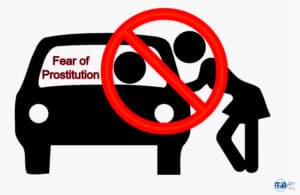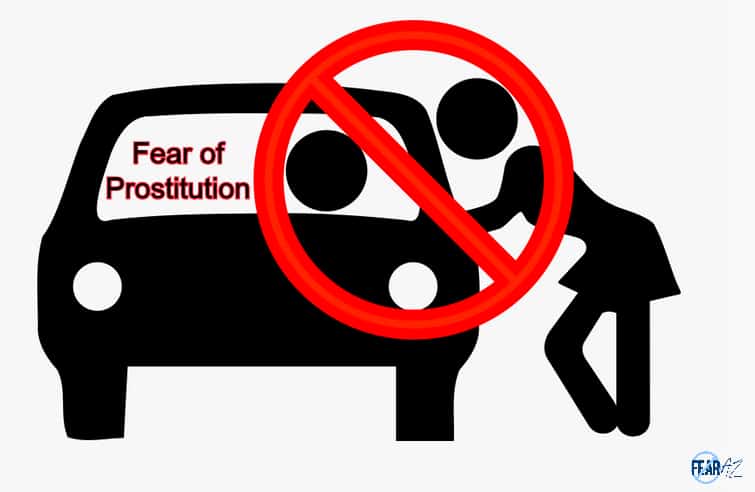Share This Article
Fear of Prostitutes: The Worlds Oldest Profession and Phobia
Do you experience a high level of anxiety at the thought of prostitutes? Do you fear you’ll contract a sexually transmitted disease? Do you always switch channels if you see a prostitute in a film or TV show?
If yes, you may be suffering from cypridophobia, or the fear of prostitutes. This fear has other names, too, including: cypriphobia, cyprianophobia and cyprinophobia.
People experiencing cypridophobia go to great lengths to avoid being anywhere near prostitutes, which can lead to mental anguish. Sharing their fears with loved ones can not only be difficult but also embarrassing.
While this phobia is uncommon, you should know that you’re not alone. If you go through the vast list of fears and phobias, you’ll come across some rather unusual ones, including cypridophobia.
It’s important to remind yourself that this phobia is just an irrational fear. And you don’t have to let it continue to affect your life. With proper diagnosis, care, and treatment, you can learn to manage the fear or even overcome it.
What Is the Fear of Prostitutes?
The fear of prostitutes, or cypridophobia, refers to the avoidance of prostitutes, sexual activity, and sexually transmitted diseases (STDs). A person suffering from this phobia fears that coming in contact with a prostitute may lead to them contracting STDs. The fear typically arises from a prejudiced notion that prostitutes spread diseases.
The word cypridophobia comes rom the Greek word kypris meaning “Aphrodite/Venus” and phobos meaning fear. The word cyprus is used for Venus as she was believed to be born on the island of Cyprus.
Given the social taboo surrounding prostitutes, many with this phobia will avoid seeking medical help or even discussing the extreme fear they experience even at the mention of the word “prostitute.” Others think they can simply avoid the subject of their fear, so they don’t seek medical intervention.
However, if left untreated, this phobia can worsen to the point where they may even avoid sexual contact with their significant others or spouses, leading to conflict in marriage and possibly even divorce. And while anyone, regardless of age or sex, can be affected by this phobia, it is more common in middle-to-older age group men.

Causes of Cypridophobia
Like all other phobias, it’s difficult to determine the exact cause or onset of the fear of prostitutes. However, environmental or genetic factors or a combination of the two are commonly responsible for a person developing cypridophobia.
Typically, young people do not have knowledge of sex or prostitutes, so the phobia develops later in life. As a person grows up and learns about sex and prostitution, the way in which they are introduced to such sensitive topics makes a difference.
Unfortunately, teenagers are often cautioned against sexual activity through stories of contracting diseases such as HIV. This can create a fear of not only prostitutes but also of sex itself.
Knowing someone who suffers from HIV or other STDs can also lead to a person fearing unprotected sex or having sex with sex workers.
Additionally, a person’s overall well-being and mental state are also contributing factors in the development of the phobia. A person who is genetically predisposed to having mental health issues or is suffering from anxiety or depression is at a greater risk of developing phobias, including cypridophobia.
Symptoms of Cyprinophobia
Let’s take a look at some of the most common physical and mental/emotional symptoms of cyprinophobia.
Physical Symptoms
- Trembling
- Muscle tension
- Increased heart rate
- Palpitations
- High blood pressure
- Nausea
- Vomiting
- Profuse sweating
- Headache
- Dizziness
- Cold flashes
Mental/Emotional Symptoms
- Anxiety
- Panic attack
- Fear of getting sick
- Fear of acquiring an STD/HIV
- Confusion
- Irritability
- Mood swings
- Feeling of dread
- Feeling of dying
Treatment for Fear of Prostitutes
There is no well-defined treatment for any phobia. Usually, a therapist will employ various therapies or even medications, either by themselves or in combination, to treat phobia. Treatment plans used for treating other anxiety disorders work well for treating cypridophobia.
Self-Help
Self-help gives you the freedom to work on your mental health at your own pace. You can learn more about your triggers and symptoms and how to deal with them through simple practices. You also get the option of taking a break if things get too overwhelming. Self-help can be effective at leading you to recovery if you follow it diligently and with a positive mindset.
Some of the most common methods/techniques used for overcoming your phobia of prostitutes are:
- Yoga
- Meditation
- Exercise
- Counting numbers
- Deep breathing
- Rhythmic breathing
- Journalling
The aim of self-help techniques is not to reset your brain or trick it into thinking nothing will happen if you have unprotected sex with a prostitute. But it will help reduce the extreme levels of anxiety or panic that one may experience when suffering from cypridophobia. It will help you re-establish the logical thinking that STDs are real and careless behavior or not practicing safe sex can be dangerous.
Professional Help
Seeking help from medical practitioners is the best way to deal with any phobia. Your therapist will first try to understand the severity of your phobia and your specific triggers. They will also try to understand why this fear has developed or if there is a specific cause.
When helping a patient with cyrpidophobia, the therapist may use methods such as mindfulness-based stress reduction (MBSR) or cognitive behavioral therapy (CBT) to help a person overcome anxiety disorders. They may also suggest dialectical behavior therapy (DBT) or exposure therapy.
In rare cases, when the therapy needs support, the doctor may prescribe anti-anxiety or antidepressant medications to help with severe symptoms such as panic attacks or extreme anxiety.
Learning to Cope with the Fear of Prostitutes
Fear of contracting STDs is not an entirely irrational fear. However, associating it with only prostitutes and going out of your way to avoid them can be damaging to your mental health. It can also lead you to develop negative views about sex workers.
A person suffering from cypridophobia is not only afraid of prostitutes, they are afraid of speaking about their fear of prostitutes. So, they will avoid sex workers and avoid talking about them at all costs. However, this is not a solution.
Speaking about your fears and getting the necessary treatment is crucial for you to overcome your phobia and live a happy life. Talk to your friends and family or join support groups where you can share your thoughts, feelings, and fears without judgment. It will not only help you find support but also go a long way in helping you progress with your recovery.
Conclusion
The fear of prostitutes can have a significantly negative impact on one’s social life as well as personal relationships. It’s important to seek help so you can regain your mental health. With time and consistency, you can soon overcome your fears and live a fulfilling life!



